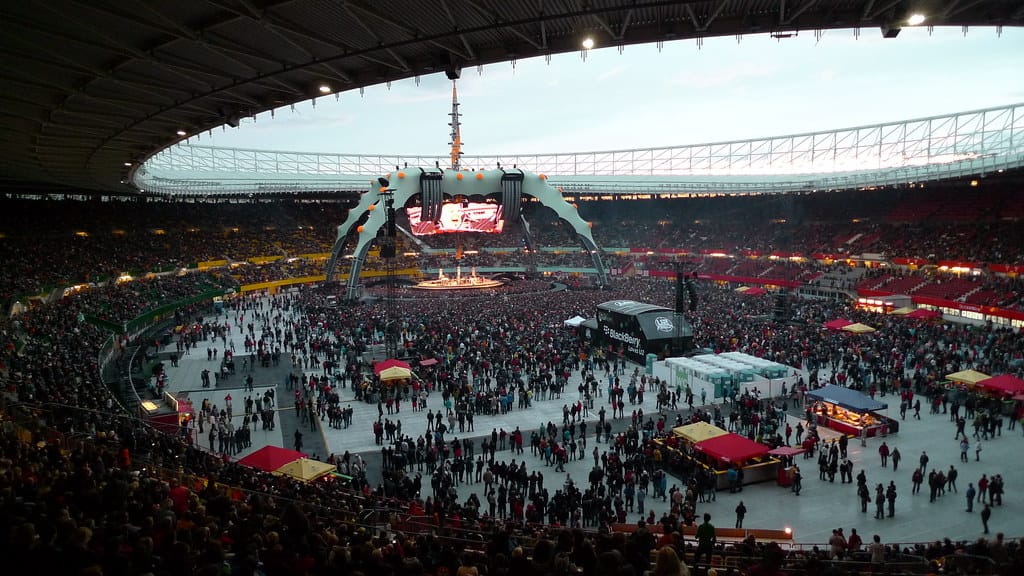Dystopia Comes to the Stadium

To be sure, we live in distressing times. We’ve been in entropy’s grip ever more frighteningly since January 6—as Trump feasibly plans a 2025 re-iteration--and it took the grim events of October 7 and beyond to catastrophically highlight the depths of man’s inhumanity to man. (And now we’re awaiting the likely opening salvos of a Middle Eastern shooting war).
But oh yes, then came a moment of national, albeit deeply blue-tinged hope: as crushingly sub-par as Joe Biden’s debate performance had been, the campaign re-launch turned into a welcome, twisting vault into (yes, joyful) competitiveness for Kamala Harris.
But next, even as Taylor Swift went from being Fairie Queen of the NFL to continuing her also joyful victory tour on the world’s stages, came a new distressing set of headlines: some brain-broken Scottish teenagers were plotting a suicide-bomb assault (with crowd-ramming cars and knifings planned as accompaniment ) at her now-cancelled three-night stand at Vienna’s Ernst-Happel Stadium.
This left 200,000 disappointed, ticket-holding Swifties. Also left quite unnerved are many of those planning to attend one of her five upcoming nights at London’s Wembley Stadium (capacity 90,000).
Even for the innumerable fans of Taylor’s clever tirades-in-song, often chronicling her turned-gnarly romances (buckle your chin strap, Travis Kelce) it was a case of tragedy properly averted. But there is a wider pooling of anxiety over what an incel (or squad of them) can do to society. What’s becoming clearer as incidents unfold over time and geography (Moscow, Vegas, Manchester, etc.) is that attendance at large concert—perhaps at any concert—is being taken off the table for a sizable group of formerly avid concertgoers.
Let’s investigate for a moment the relevance that may be found in the M. Knight Shyamalan feature now in theaters (and to stream on Max on a later date TBD), “Trap”. It’s mostly been greeted as with such phrases as “moderately entertaining” or “rarely scary, sometimes suspenseful, always silly.”
Let’s just admit it is not the return to a perhaps vanished form we’ve been waiting for since 1999’s “The Sixth Sense,” and as it hovered not far beyond $20 million in box office heading into its second Friday, it seemed not to gain much traction even as it notably sets a tale of mortal fear against a very Swiftian concert scenario.
It portrays but can’t quite replicate the impact of the manufactured, teen-friendly ecstasies of this sort of arena pop, offering a familiar a compound of nictitating, outsize video screens, multiple costume changes, crotch-socking dancers and lovelorn plaints.
Grasping fitfully for an insider’s view behind the scenes, it lets plot points dictate an inauthenticity that takes some of us out of the story. The scenario needs to put heroine Lady Raven (Shyamalan's daughter Saleka, for better or worse) alone in a limo with villain Cooper Adams (nice to have Josh Hartnett back, but why in this?), and therefore, as never would or could happen with even a middling arena goddess, she is left bereft of any security guardians save for an ineffectual chauffeur.
You bet right, there will be a lot of monkey business with mobile phones.
As described in Tim Grierson’s nuanced take in today’s Los Angeles Times, the director has long been in search of something to excite the base he found with “The Sixth Sense” (he’s come closer than this with “Unbreakable” and “Split”), but the famous twist of his debut has remained a thundercrack he can’t seem to match. For him to put his daughter not only center stage with her okay tune-smithing and delivery, but also almost unrelievedly onscreen through the labored third act, is at some level an admirable proud dad move—but dares still more squandering of reputational capital. There are plot twists to spare, but the problem of matching earlier auteurist grandeur remains even as it grinds on. “Maybe if he’d stop pursuing such endings,” writes Grierson, “We would have forgiven him by now.”
One does feel for Hartnett, who assiduously chirps up to bring some humor to the father-daughter interactions. But with the obtuseness he exhibits while exercising his ironically-pitched evil streak, the character seems to be winking at the camera, and therefore we moviegoers, all too often.
Similarly to “Split,” (and as Richard Brody points in The New Yorker, the great cinematic forerunner that is Hitchcock’s “Psycho”), there a cruelly-dominant-mom story evoked through some awkward, fleeting visuals that we gather are popping up from the Freudian recesses of Cooper’s imagination. (One is in the men's room--points to this scene for summoning up the actual Swift concert tour’s amiable chaos in which female concertgoers stage takeovers of the men’s bathroom facilities.
Shyamalan has described the tone of the film– as if ‘Silence of the Lambs’ happened at a Taylor Swift concert.” Far from the 1991 film's lonely monster Hannibal Lecter (who apparently haunts Trump’s dreams alongside Kamala Harris), Hartnett’s a sort of Everyman (and in fact, a fireman). Later revelations late in the script reveal he should have kept a closer watch on his wife, adding heft to Brody’s summation: “Positing a mother complex as Cooper’s motivation shifts viewers’ attention from one that’s hiding in plain sight: the commonplace horrors of a mundane family life.”
Another perspective comes from the always piquant Matt Zoller Seitz on Vulture site where he forgives all the lack of verisimilitude throughout Shyamalan’s whole career and finds in “Trap” a fine example of a subgenre called “’the preposterous thriller,’ where things that simply could not happen occur regularly, and the entire tale unfolds with the feverish matter-of-factness of a nightmare.”
Reality-shorn though it may be, “Trap”’s plotline of deploying armies of cops to ferret out a serial killer does take inspiration from a couple touchpoints of wider context. The director was reportedly intrigued by a famous sting of December,1985, in which the U.S. Marshals Service invited 3,000 fugitives from across Washington D.C to collect free tickets to a local NFL game, and arrested them at the stadium when they turned up. Perhaps more disquieting to privacy advocates, and said to be one of Shyamalan’s inspirations, on Swift’s 2018 “Reputation” tour, her management and security operatives outfitted video kiosks outside the concert with facial-recognition cameras linked to pictures of potential stalkers.
No doubt the organizers of the Wembley dates, in concert with an anti-terrorist wing of Scotland Yard (and the national and global intelligence services) will use England’s unparalleled video surveillance network to scan the masses at this month’s show. And bravo to that. (It was U.S. that used cyber-monitoring to spot the teen ISIS cadre in Vienna).
If the coming, consequential showdown between heavy surveillance and life as a Swiftie sets new challenges for entertainment, it’s worth recalling Cooper’s empathetic words to his daughter– who often sees her supposed friends cavorting on social media without her: “It must be hard, seeing what everybody’s doing all the time.”


Comments ()